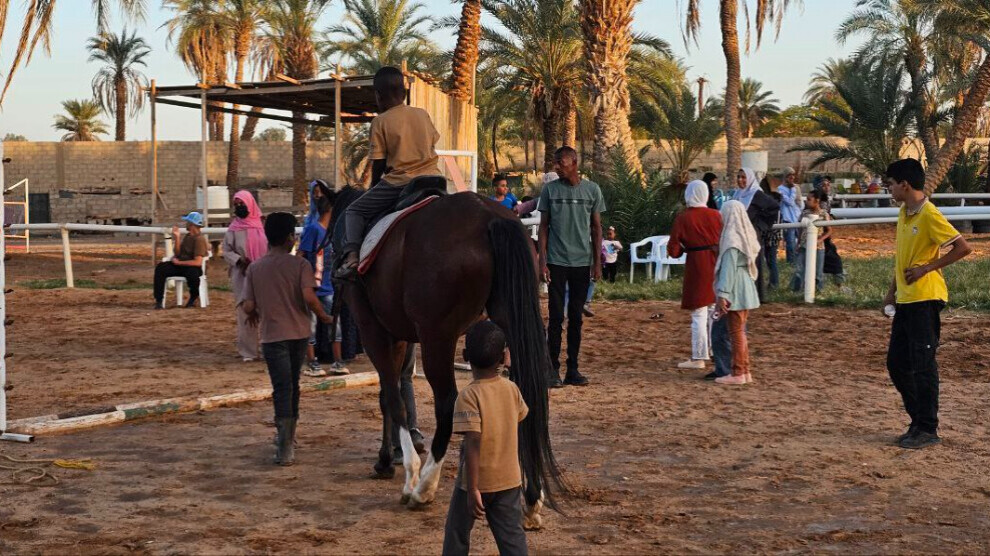Autistic Children in Southern Libya: Mothers on the Frontlines of Neglect
In the absence of official support, mothers in southern Libya are leading the fight for their autistic children, through community initiatives that inspire hope and highlight the urgent need for specialized, comprehensive rehabilitation centers.

Mona Tuka
Libya - Despite Libya’s ratification of the Convention on the Rights of Persons with Disabilities (2008) and the Convention on the Rights of the Child (1990)—both guaranteeing the right of autistic children to education, rehabilitation, and healthcare—the reality in southern Libya tells a different story. A near-total absence of government support has left mothers to shoulder the burden alone, driving them to launch small community initiatives that offer glimmers of hope amid systemic neglect.
Small Steps Toward Hope
In the city of Sabha, local women have begun organizing recreational and sports activities for children with autism—such as horseback riding sessions at the Fursan Al-Qardabiya Club—through coordination with the Fezzan Women’s Council. While modest in scale, these initiatives have drawn attention to a larger issue: the government’s absence, and the mothers’ tireless fight for their children’s rights.
No Specialized Centers
Jamila Al-Jamali, director of the Fezzan Women’s Council Office and co-founder of the Mothers of Autistic Children Foundation, described the daily challenges faced by families.
“We support any effort that benefits autistic children—whether through sports or social activities. But the harsh reality is that there’s no real institutional interest in them,” she said.
She explained that the only existing center in the area is too small to meet the needs of the region’s children:
“We have around 150–200 children in need of services, but the center’s capacity is minimal compared to the actual numbers across southern Libya. These centers are practically non-existent.”
Al-Jamali emphasized that both children and mothers require comprehensive support:
“Children need therapy, education, and training, while mothers need psychological and social assistance. I’ve seen how painful it becomes when a child grows older—especially during adolescence—because the challenges multiply. Many mothers suffer deeply as they watch their children struggle to eat, move, or communicate. That’s why our foundation focuses on teaching mothers how to support their children at home, using simple educational tools and exercises to encourage speech and interaction.”
The Role of Recreational Activities
Al-Jamali believes recreational activities are essential: “We organize events like horseback riding, bazaars, and park outings because they help children develop motor and communication skills, and boost their self-confidence. For mothers, these gatherings are therapeutic—they reduce depression and isolation by giving them a chance to connect with others. These small moments of relief matter.”
The Mother as Both Victim and Fighter
Working with mothers begins gradually, she explained: “We start by training mothers on how to handle behavioral issues, speech therapy basics, and life skills. We hold discussion sessions where mothers and children can ask legal and educational questions, and we try to build a small, supportive community around them. Our ultimate goal is to bring autistic children out of isolation and give them opportunities to grow and learn.”
Still, she noted, the absence of government programs remains the core problem:
“Every mother carries an enormous responsibility. Autistic children need constant training and specialized centers, but there’s no government presence in this field. For now, local initiatives are the only lifeline—but they’re nowhere near enough.”
“We Travel for Hours to Find Help”
Messaouda Saleh, mother of a young autistic girl, shared her story:
“Here in the south, we suffer greatly from the lack of specialized centers. Once a child is diagnosed, they should immediately have access to a full therapeutic environment with experts in speech, behavior, and life skills. This is crucial not only for the children but also for us mothers, so we can learn how to care for them properly.”
She added: “Because there are no specialized schools nearby, we often have to travel long distances just to find the right care and education. A proper center would give our children hope—and a real chance to integrate into society.”
Through training workshops on behavioral therapy and speech development, Messaouda learned effective ways to help her daughter communicate:
“Many autistic children don’t speak at first, but the techniques we learned helped us encourage them to express themselves. Gradually, they become more open and engaged with others—it’s life-changing.”
The Legal Framework
International law affirms the rights of autistic children:
- The Convention on the Rights of Persons with Disabilities (2008) guarantees the right to education, rehabilitation, and social inclusion, obligating governments to provide proper facilities and services.
- The Convention on the Rights of the Child (1990) ensures every child’s right to life, growth, education, and protection from neglect and discrimination.
But in southern Libya, these rights remain largely theoretical. The absence of institutional support has forced mothers to become the de facto advocates, caregivers, and educators for their children.
Turning Pain into Purpose
The plight of mothers of autistic children in southern Libya reveals a layered form of marginalization—state neglect, poor infrastructure, and immense social pressure. Yet, within this hardship lies resilience. Through small initiatives like recreational events and community bazaars, these women transform despair into action.
Until real political will emerges to prioritize the rights of children and their mothers, these women will continue to stand as the first—and often only—line of defense. Their efforts, however small, create ripples of hope in a landscape of silence, proving that even the tiniest act of care can mean everything in a forgotten corner of the world.
